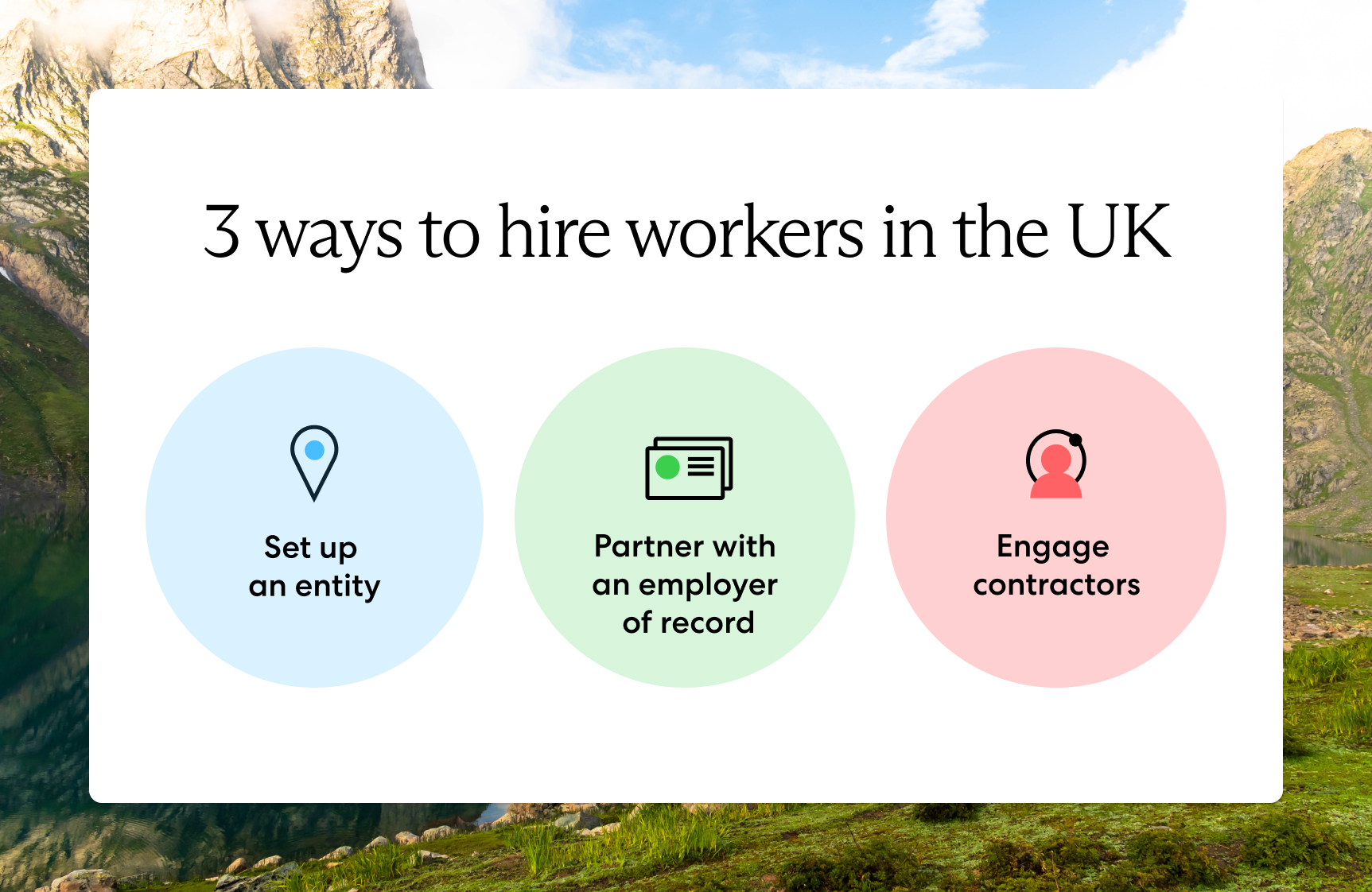With its vibrant culture, high living standards, and quality education, the U.K. is a magnet for top global talent and has one of the most skilled domestic workforces in the world.
American companies can conveniently tap into this English-speaking market with few cultural obstacles and find the talent they need to stay competitive.
Still, hiring employees in the U.K. from abroad comes with unique compliance risks, from clarifying your permanent establishment status and correctly classifying talent to running compliant global payroll.
This guide explains how U.S. companies can compliantly hire and pay employees in the U.K. Discover the compliance risks American companies face when entering this market and get tips on mitigating risk. Plus, find out how to hire employees in the U.K. without setting up a legal entity.
Can a U.S. company hire a U.K. employee?
Yes, U.S. companies can hire U.K. employees. However, hiring U.K. employees abroad involves unique challenges, such as navigating foreign tax and employment regulations and running compliant global payroll. Partnering with a global expert, such as an employer of record (EOR), helps simplify the hiring process while mitigating risk.
How can a U.S. company hire a U.K. employee?
U.S. companies can hire U.K. employees in one of three ways: establishing a legal entity, engaging international contractors, or partnering with an EOR. The best approach for your business depends on how many employees you plan to hire, your budget, and your long-term strategic goals for doing business in the U.K.
We discuss each approach in detail below.

Set up a local entity in the U.K.
The traditional approach to hiring U.K.-based talent from abroad involves setting up a legal entity in Great Britain and engaging local talent directly. Establishing a legal entity in the U.K. gives your company full autonomy to create a local branch and handle employment logistics internally, from hiring and onboarding to running global payroll.
Entity establishment simplifies the hiring process and reduces risk exposure. If you plan to hire a large team or establish a long-term presence in the U.K., entity establishment is a wise choice as it positions your company for growth and reduces employment costs in the long run.
However, entity establishment is expensive and time-consuming. It’s not an ideal use of time and resources if you plan to hire a small number of U.K. employees. Setting up an entity requires in-country knowledge of U.K. corporate, tax, and employment regulations, thus requiring a team with sufficient expertise and bandwidth to ensure compliance.
Partner with an employer of record (EOR) in the U.K.
A simpler approach to hiring employees in the U.K. is to partner with an EOR. An EOR is a third-party entity with global infrastructure and international legal expertise that eliminates the guesswork and risk associated with building international teams.
An EOR in the U.K. can offer support at every step of the way as you enter the U.K. market and start engaging talent across the region. An EOR can handle everything from hiring, onboarding, and risk mitigation to running global payroll, administering global benefits, and offering ongoing HR support to your U.K. team on your behalf.
Partnering with an EOR is an ideal solution for U.S. companies that want to test the waters of the U.K. market before making long-term investments or those that want to engage local talent while undergoing incorporation.
An EOR serves as a flexible, low-commitment approach to hiring employees in the U.K., allowing you to expand into the U.K. and build a local workforce at a pace that suits your needs.
Learn more: What Is an Employer of Record (EOR)?
Engage contractors in the U.K.
Some U.S. companies forego hiring full-time employees in the U.K. and hire international contractors instead, seeing it as a streamlined approach to building a distributed workforce in the U.K.
Engaging contractors allows you to target British talent with specialized skills while saving the time and money it would take to onboard and pay full-time employees.
However, engaging international contractors comes with considerable disadvantages. Because companies often hire contractors for short-term projects, this approach limits your opportunity to build the cohesive, committed team you need for long-term growth and agility.
Plus, engaging contractors increases your risk of worker misclassification, resulting in back taxes, benefits arrears, reputational damage, and other legal hangups. We discuss contractor misclassification risk in more detail later on.
How much does it cost to hire an employee in the U.K.?
The cost of hiring an employee in the U.K. is, at a minimum, 16.88% of the employee’s base salary. This is because the employer must contribute 13.8% of their employee’s base salary to National Insurance and 3% to a workplace pension.
Interested in hiring employees in the U.K.? Use our employee cost calculator below to get reliable insights into employee costs and payroll contributions in the U.K.:
How do U.S. companies pay U.K. employees?
U.S. companies that hire employees in the U.K. have three options to pay their British workforce. They can set up a legal entity and run payroll internally, partner with a local payroll vendor, or outsource their U.K. payroll to a global payroll partner.
All three options allow global companies to expand their workforce, but the first two require far more commitment and risk. We summarize the pros and cons of each approach below.
Internal payroll
If your company is eyeing entity establishment in the U.K., consider creating an in-house finance team and handling payroll internally. Remember, while this approach gives you complete control over the payroll process, it leaves your company fully responsible for ensuring compliance with U.K. tax and withholding regulations.
Local payroll outsourcing
By outsourcing payroll to a local payroll provider, you can offload the burden of your entire payroll process to a third-party legal entity with local expertise. A local vendor handles calculations, payments, and filings on your behalf.
However, with this approach, you lose visibility into the payroll process, making it difficult to correct errors and delays. Plus, if you plan to expand into other countries, you’ll likely end up working with different vendors in each market, further siloing payroll and decreasing visibility even more.
Global payroll outsourcing
The simplest and safest way for a U.S. company to pay international employees is to outsource payroll to a global payroll partner. A global payroll partner is a third-party entity with expertise in international payroll and tax laws, including in the U.K., that administers payroll for your global workforce on your behalf.
A global payroll partner coordinates with local payroll vendors worldwide, giving you the freedom to build distributed teams in the U.K. and beyond while ensuring compliance with local payroll regulations.
Plus, a global payroll partner streamlines your payroll processes into a single workforce management platform, helping you reduce errors, ensure compliance, and maintain transparency, no matter where your team resides.
Compliance risks when hiring U.K. employees
Regardless of your approach to hiring employees in the U.K., remember to exercise due diligence and familiarize yourself with the compliance risks of operating in this market.
U.S. companies' main risks when engaging talent in the U.K. involve permanent establishment, worker classification, payroll taxes, wrongful termination, and immigration requirements.
We discuss these risks in detail below and offer tips for ensuring compliance.
Permanent establishment
When a company operates with a fixed location in a foreign country and generates revenue there, this can trigger permanent establishment status and subject the company to local corporate taxation.
While the conditions that trigger permanent establishment vary worldwide, most countries use a similar set of guidelines. In the U.K., permanent establishment applies to any non-resident company that does business in the country under any of the following circumstances:
- A foreign company has a fixed place of business in the U.K. through which it wholly or partially carries out its business, such as a factory or workshop
- A foreign company hires a local agent that regularly exercises the authority to do business and close contracts in the U.K. on behalf of the U.S. company
Due to the nuances of U.K. tax regulations, U.S. companies often struggle to accurately determine their permanent establishment status while operating in this market.
For example, a fixed place of business in the U.K. refers to physical offices, workshops, and factories. However, a foreign company doesn’t trigger permanent establishment status in the U.K. if the activities of their fixed place of business are only preparatory or auxiliary in nature.
Determining which side of the line your business operations land on can be confusing. U.S. companies hiring employees in the U.K. must have an experienced legal team on board with expertise in U.K. tax and corporate law to avoid noncompliance.
Misclassifying employees
U.S. companies that engage contractors in the U.K. must be aware of their misclassification risk.
Worker classification refers to how you designate talent—as employees or contractors. While the concept of worker designations is relatively straightforward, classification regulations in the U.K. feature nuances that leave room for interpretation, creating challenges for foreign companies unfamiliar with the local law.
Plus, the U.K. has a third designation called the worker, which is between a full-time employee and a contractor and entitles individuals to minimum wage, holiday pay, and pension guarantees. This designation doesn’t exist in the U.S., creating an added layer of risk.
Consider platform workers in the U.K., for instance. Drivers and couriers working for companies like Uber and Bolt in the country usually work as independent contractors. However, a recent lawsuit alleged that Uber’s relationship with its U.K. drivers was that of a worker-employer rather than a contractor-client.
The U.K. Supreme Court ruled that Uber had tightly defined and controlled its drivers’ daily duties by setting fares, controlling contract terms, and penalizing drivers who rejected too many rides, all of which are against the law under a contractor-client relationship. Uber faced misclassification penalties amounting to £615 million in back taxes.
It’s relatively easy to unknowingly overreach the boundaries of your contractor-client relationship in the U.K. and find yourself in trouble. Having an experienced legal team at your side with local expertise is critical for avoiding misclassification.
Remember: U.S. companies that hire contractors in the U.K. should also familiarize themselves with local tax and reporting laws. For example, all U.K. employers working with IR35 contractors must withhold taxes and statutory contributions from their contractors’ wages just like they would for full-time employees.
Learn more: Employee and Contractor Misclassification: Complete Guide
Incorrect payroll contributions
One of the primary compliance risks U.S. companies face when hiring employees in the U.K. involves navigating local payroll tax regulations.
Despite being a foreign employer, all U.S.-based companies that hire employees in the U.K. must withhold contributions to state-backed insurance programs from their employees’ wages.
Statutory contributions in the U.K. include the following:
- National Insurance Contributions (NICs)
- Pension scheme
- Taxes on benefits-in-kind (BIKs)
All employers in the U.K. must also withhold and remit income tax from their employees’ gross earnings.
Ensuring your HR team can navigate the U.K.’s payroll tax regulations is critical for delivering accurate, timely payments to your British workforce and avoiding fines and other penalties.
Learn more: Payroll and Tax in the U.K.: An Overview for Global Employers
Providing statutory benefits
Statutory benefits in the U.K. differ drastically from those in the U.S. As a result, American companies operating in this market may be unfamiliar with the benefits they must offer their local employees, such as maternity leave and sick pay.
Below, we list the statutory benefits that U.S. companies hiring employees in the U.K. should know:
- National health insurance. The U.K. offers free medical care under the National Health Service (NHS) universal healthcare system. England, Northern Ireland, Scotland, and Wales each have their own system, so employers must learn local requirements.
- Pension. U.K. employers must contribute to a workplace pension scheme and contribute at least 3% to the pension. Employees contribute 5% to their pension. However, contribution rates may vary depending on the type of pension scheme.
- Annual leave. Full-time employees receive 5.6 weeks of paid annual leave, although some employers offer more. Employers may also combine annual leave with public holidays.
- Maternity leave. Mothers receive 52 weeks of paid maternity leave at 90% of their average weekly earnings (AWE) for the first six weeks. After that, they receive either £172.48 per week or 90% of their AWE, whichever is lower.
- Paternity leave. Fathers receive two weeks of paid paternity leave at £172.48 per week or 90% of their AWE, whichever is lower.
- Sick pay. Eligible employees receive 28 weeks of Statutory Sick Pay (SSP) at £109.40 per week.
Learn more: U.K. Employee Benefits: A Guide to Mandatory and Common Benefits
Wrongful termination of employment
Like statutory benefits requirements, U.K. termination laws may be unfamiliar to U.S. companies, creating added risk.
A key difference between American and British employment law is that the U.K. does not follow at-will employment, which allows employers and employees to terminate a work contract without notice.
The statutory minimum notice period in the U.K. ranges from one to 12 weeks, depending on the employee’s length of service. Still, employers and employees often agree to longer notice periods in their work contracts.
In the case of unjust termination, employers must provide employees who have worked for their company for at least two years with a severance package consisting of the following:
- Half a week’s pay for each full year the employee was under the age of 22
- One week’s pay for each full year the employee was between 22 and 41
- One and half week’s pay for each full year the employee was 41 or older
The U.K. government caps severance payment calculations at 20 years of service.
If a company wrongfully terminates an employee in the U.K. or doesn’t provide adequate severance, the employee can take their employer to court for compensation. Plus, the federal government may place the company on an online list of offenders, significantly damaging their business reputation.
Immigration requirements
U.K. citizens do not need a visa to work remotely for a U.S. company while residing in the U.K.
However, you may find yourself in a situation where you want to hire a foreign national in the U.K. or relocate a domestic employee to the U.K. as a part of your global mobility program. In either case, your HR team will need to acquire proper work visas and permits for your team.
The U.K. has several work visa tiers, each with multiple visas that involve different application procedures. We list three of the U.K.’s most common work visa tiers below:
- Tier 1. This tier includes visas for highly skilled individuals, such as the Global Talent visa, Innovator Founder visa, and Investor visa. Tier 1 visa holders can work unrestricted as employees or contractors in the U.K. for an extended period.
- Tier 2. This category includes permits for skilled workers who have an eligible job with an approved employer. This tier includes the general Skilled Worker Visa, Sportsperson visa, and Intra-Company Transfer visa.
- Tier 5. This category includes visas for seasonal or temporary work, such as charity work and entertainment.
Work visa applications and relocation procedures can interfere with day-to-day business operations, causing interruptions and delays as you scale your local workforce.
U.S. companies must have an experienced HR team that can swiftly navigate the ins and outs of British immigration as they relocate and onboard new talent in the U.K.—from handling document collection, translation, and administration needs to confirming endorsement eligibilities.
Consider partnering with a global immigration expert, such as an EOR, and give your team the freedom to move without delays.
Compliantly hire U.K. employees with Velocity Global
The U.K. talent pool offers American companies a wealth of opportunities. Partnering with an experienced international partner like Velocity Global better positions you for a quick and compliant entrance into this market.
Velocity Global’s integrated suite of solutions simplifies hiring, paying, and supporting talent in over 185 countries, including the U.K., while eliminating the need for entity establishment.
Our EOR solution handles everything from hiring, onboarding, and immigration procedures to risk mitigation, running global payroll, and providing ongoing HR support for your British workforce on your behalf. We handle the heavy lifting so you can hire employees in the U.K. without the added burden.
Plus, our expert team can help you craft locally tailored benefits to ensure your company becomes an ideal landing spot for top British talent.
Contact us today to learn how to quickly and compliantly hire employees in the U.K. and beyond.
Disclaimer: The intent of this document is solely to provide general and preliminary information for private use. Do not rely on it as an alternative to legal, financial, taxation, or accountancy advice from an appropriately qualified professional. © 2024 Velocity Global, LLC. All rights reserved.



